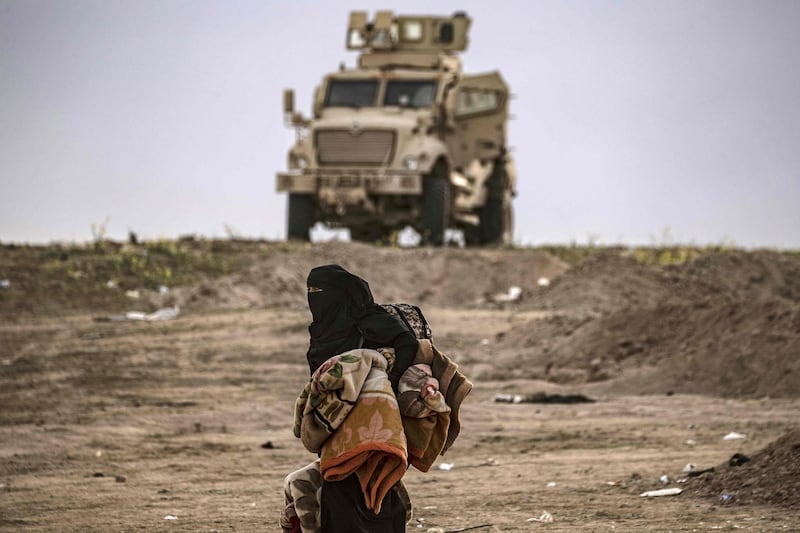For a group that once dreamed of first ruling the Middle East and then the world, it could scarcely be more humiliating. Five years after hoisting its black flag in the Iraqi city of Mosul, ISIS has been routed from all but a tiny corner of the vast territory it once occupied in Syria and Iraq. Today, all that remains of its so-called caliphate is the eastern Syrian town of Baghouz, the scene of a ferocious last stand between die-hard militants and the US-backed Kurdish-led militias of the Syrian Democratic Forces.
For Donald Trump, this final assault on ISIS’s last redoubt is proof that the group is “100 per cent” defeated, as the US president declared last week. However, the big question is whether Baghouz represents the end of the battle, or merely the beginning of a new one. Even Mr Trump has warned that many of ISIS’s footsoldiers are still on the loose. By some estimates that could mean anything up to 10,000 people.
That number constitutes the rump of a movement that was once at least 60,000 strong and took a unique pride in its savagery – mass beheadings, the attempted genocide of the Yazidis, the burning alive of prisoners of war. Even in its demise, the scars of ISIS’s reign are deep and will remain visible for many years, in the trauma of those who experienced its atrocities, the way its perversion of Islam has altered the culture of the places it once dominated and the nihilistic destruction it wrought.
In fact, so obsessed with death and violence was ISIS that it almost welcomed its own annihilation. According to the group’s former chief spokesman, Abu Mohammed Al Adnani, the loss of physical territory was always to be expected. True defeat would only come, he once declared, if its followers “lost the will and the desire to fight”.
Al Adnani was killed in 2016 by a US airstrike on northern Syria – one of thousands that have demolished ISIS's senior leadership. However, the group has never needed a formal command structure to sustain itself. Al Adnani's idea of conflict without borders is particularly relevant to the many foreign fighters who joined ISIS in Syria and Iraq. Men such as Mark Taylor, the New Zealander recently interviewed by The National who now languishes in a Kurdish jail.
ISIS’s foreign legion – which included an estimated 4,000 westerners – came from all over the world. France, the United States, South Africa, Trinidad, Chechnya and beyond. Although many of them are now either dead or incarcerated, those at liberty pose a formidable challenge for security services around the world.
Some of them may now head to theatres of conflict such as Yemen or Afghanistan, Nigeria or the Philippines. They may fight under the banner of ISIS, they may join Boko Haram or Al Qaeda, or they may form a new group entirely. Some, on the other hand, might go back home and bring chaos to the streets of Europe and the United States as lone wolves.
Small wonder, then, that in many western capitals, the fall of ISIS is as big a worry as its rise was. In the UK, some 400 of the estimated 800 British nationals who joined ISIS are thought to have returned already. Others have not been given that opportunity.
Take, for instance, Shamima Begum, a British schoolgirl who joined ISIS in 2014. After being found in a Syrian displacement camp, she told the press that she did not regret her decision, but expressed a wish to return to London. Last month, the UK Home Secretary Sajid Javid announced the government's intention to strip her of citizenship.
So, just how serious is the threat that ISIS now poses to western nations? Even the experts appear to be largely in the dark. In a report for the Soufan Centre, a respected British security think-tank, Richard Barrett, a former MI6 officer, said: “To what extent the dispersed veterans of the war in Iraq and Syria will wish to regroup, resurge, recruit and recreate what they have lost, is as yet unknown."
Some are, undoubtedly, extremely dangerous. But, in their dire warnings, European police chiefs may be deliberately erring on the side of pessimism. No senior officer wants to tell the public they are safe, only for a suicide bomber to strike the following week. However, if the blowback from the demise of ISIS was anything like as bad as many have feared, nations such as the UK, France and Belgium would have already seen many more terror attacks than they have.
Extremists have struck in these places – with machetes on London Bridge, bombs at Brussels airport and with trucks ploughing through Bastille Day crowds in Nice. But these outrages were committed at the height of the caliphate and none of the perpetrators were returnees. It is also worth remembering that, given the millions of Muslims living in the West, the numbers who were seduced by ISIS’s murderous ideology has always been vanishingly small.
Many of the groups' foreign fighters – be they from Tottenham or Tunis – joined to be part of a success story, to fill a void of opportunity and achievement in their lives. Think of Mohammed Emwazi, the young Londoner who became known as "Jihadi John", and all the other disaffected young men, radicalised online and by opportunistic preachers, who became ISIS's most notorious avatars. To them, the caliphate offered a gruesome Disneyland – a real place, with real weapons and real death. Having lost its territory, ISIS will also have lost much of that appeal.
The groups’s ideas will, of course, remain potent for some. But joining up will be much harder now. While reaching Syria required only a budget airline ticket to Turkey and a trip across the border, following the cause to Afghanistan, Nigeria or the Philippines is considerably more arduous.

Then there is the fact that none of ISIS’s global outposts have really succeeded. The only one to hold meaningful territory was in Libya, seizing the city of Sirte for a year before it was driven out by western-backed militias in 2016. The group has active cells in Sinai and Yemen, but they only function as a hit-and-run guerrilla force. In Afghanistan, it is regularly attacked by the Taliban. And in Somalia – once tipped as prime ISIS real estate – the deeply rooted Al Shabab has confined it to a few remote mountains in the north.
Perhaps even more importantly, none of these arenas have the historic symbolism of Iraq and Syria. It was no coincidence, for example, that Emwazi staged one of his executions near the Syrian town of Dabiq, where Islamic lore holds that an end-of-days battle will take place between Muslims and their enemies.
Indeed, if ISIS does re-emerge anywhere, it is likely to be with local fighters in its previous Middle Eastern strongholds.
Consider Mosul, where the caliphate was first declared in 2014. Even before ISIS captured the city that year, it had long enjoyed support among Sunni Muslims, styling itself as a resistance force against the sectarian, Shia-dominated Iraqi army. Similar tactics also gave it control of Fallujah, Ramadi and much of the rest of Sunni-dominated western Iraq.
Today, residents of these towns and cities are quick to denounce ISIS, saying that had they known of the horrors its rule would bring, they would never have hosted its members. Yet 10 years ago, they said the same thing about Al Qaeda, which took control in a similar way during the US occupation.
To stop people making this mistake a third time, the Iraqi government is now attempting to deliver a mammoth, UN-backed reconstruction and employment programme – something few believe it is capable of. Harder still will be the task of creating security forces that enjoy the respect of local people.
Similar rebuilding will have to be done in Syria, in cities and villages such as Raqqa and Baghouz. Again, the challenge will be to make that new, positive vision take shape faster than extremists can offer an alternative. The caliphate may be gone for now. But it would be foolhardy to bet that black flags will never be hoisted in Iraq or Syria again.
Colin Freeman is a foreign affairs journalist and former chief foreign correspondent of the Sunday Telegraph, who was based in Iraq from 2003 to 2005. He is the author of Kidnapped: Life as a Somali Pirate Hostage





